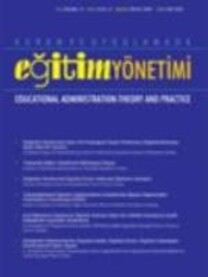Batılı Eğitim Araştırmalarının Gözden Düşüşü ve Okullaşma Konusundaki Yanlış Düşüncelerle Piyasa Arasındaki Talihsiz Denge
The Decline of Western Education Research and the Unfortunate Balance of Trade in the Marketplace of Bad Ideas About Schooling
___
- Adams, H. (1918). The education of Henry Adams (1931 ed.). New York: Random House (Retrieved May 31, 2006, from http://www.bartleby.com/159/5.html) A rendt, H. (1959). The Human Condition. Chicago: University of Chicago Press.
- Bauman, Z. (1998). Globalization: The human consequences. New York: Columbia University Press.
- Callahan, R. (1962). Education and the cult of efficiency. Chicago: University of Chicago Press.
- Cohen, D. (1988). Teaching Practice: Plus ça Change. East Lansing, MI: National Center for Research on Teacher Education. (ERIC Document Reproduction Service No. ED 299257)
- Cremin, L. A. (1980). American education, the national experience, 1783-1876. New York: Harper and Row.
- Foster, W. P. (2004). The decline of the local. Educational Administration Quarterly, 40(2), 176-191.
- Giroux, H. A. (2000). Stealing innocence: Youth, corporate power, and the politics of culture. New York: St. Martin's Press.
- Hobsbawm, E. (1992). Nations and nationalism since 1780: Programme, myth, reality (2nd ed.). New York: Cambridge University Press.
- Howley, A., & Howley, C. (2006). Thinking about school administration: New theories and innovative practice. Mahwah, NJ: Lawrence Erlbaum Associates.
- Howley, C., & Howley, A. (2004). School Size and the Influence of Socioeconomic Status on Student Achievement: Confronting the Threat of Size Bias in National Data Sets. Education Policy Analysis Archives, 12(52). Retrieved June 7, 2006, from http://epaa.asu.edu/epaa/v12n52/)
- Louisiana Department of Education. (2003). Small school districts and economies of scale. Baton Rouge, LA: Author. (Retrieved June 2, 2006, from http://www.doe.state.la.us/lde/uploads/3475.pdf )
- Mills, C. W. (1956). The power elite. New York: Oxford University Press. (Retrieved May 31, 2006, from http://www.thirdworldtraveler.com/Book_Excerpts/ HigherCircles_PE.html)
- Phillips, D. C. (2006). Muddying the waters: The many purposes of educational inquiry. In C. F. Conrad & R. Serlin, C. (Eds.), The Sage handbook for research in education: Engaging ideas and enriching inquiry (pp. 7-22). Thousand Oaks, CA: Sage Publications.
- Prakash, M. S., & Stuchul, D. (2004). McEducation marginalized: Multiverse of learning-living in grassroots commons. Educational Studies, 36(1), 58-73.
- Sassen, S. (1996). Losing control? Sovereignty in an age of globalization. New York: Columbia University Press.
- Schoenfeld, A. H. (2006). What doesn't work: The challenge and failure of the What Works Clearinghouse to conduct Meaningful reviews of studies of mathematics curricula. Educational Researcher, 35(2), 13-21. (Retrieved June 11, 2006, from http://www.aera.net/uploadedFiles/ Publications/Journals/Educational_Researcher/3502/2003ERv2035n2002_Schoenfeld.pdf)
- Scott, J. (1998). Seeing like a state: How certain schemes to improve the human condition have failed. New Haven: Yale University Press.
- Scriven, M. (1999). The nature of evaluation: Part I, relation to psychology. Washington, DC: ERIC Clearinghouse on Evaluation and Assessment (ERIC Document Service Reproduction Service No. ED435710; Retrieved Jun 7, 2006, from http://eric.ed.gov/ERICDocs/data/ericdocs2/conten _storage_ 01/0000000b/80/2a/2f/33.pdf)
- Spring, J. (1998). Education and the rise of the global economy. Mahwah, NJ: Lawrence Erlbaum Associates.
- Wilde, O. (1992). The soul of man under socialism In J. Bristow (Ed.), The importance of being earnest and related writings (pp. 164-196). London: Routledge. (Original work published 1891; Retrieved June 7, 2006, from http://praxeology.net/OW-SMS.htm)
- Wills, G. (2003). The negro president: Jefferson and the slave power. Boston: Houghton Mifflin.
- Williams, R. (1973). The country and the city. New York: Oxford University Press.
- ISSN: 1300-4832
- Yayın Aralığı: 4
- Başlangıç: 1995
- Yayıncı: Pegem Akademi Yayıncılık Eğitim Danışmanlık Hizmetleri Tic. Ltd. Şti.
Rogers'ın Yeniliğin Yayılması Teorisi ve İnternetten Ders Kaydı
Rogers'ın Yeniliğin Yayılması Teorisi ve İnternetten Ders Kaydı
Eğitim Yönetiminde Kuramsal Bilginin Üretimine ve Uygulamasına İlişkin Bir Değerlendirme
Kadir BEYCİOĞLU, Burhanettin DÖNMEZ
Yeni Sosyal Bilgiler Dersi Öğretim Programının Uygulamadaki Etkinliğinin Değerlendirilmesi
Mehmet Nuri GÖMLEKSİZ, İlhami BULUT
Eğitim Fakültesi Öğrencilerinin Üniversitenin Örgütsel İmaj Düzeyine İlişkin Algıları
